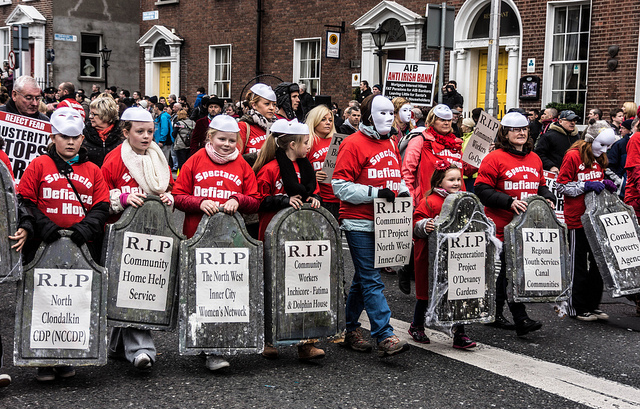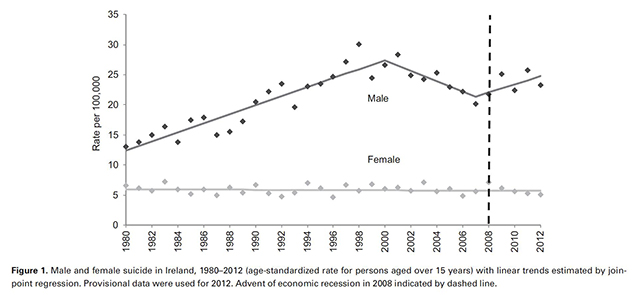
The economic crisis that began in 2008 in Europe and the United States has been associated with rising suicide rates in many countries, an indictment of the austerity implemented by political leaders on both sides of the Atlantic and largely supported by the mainstream media. A new, significant study of the case of Ireland reveals that a total of 500 additional suicides have happened in the country between 2008 and 2012, compared to the number expected had pre-recession trends continued. (1)
Conducted by researchers at University College Cork, the study confirms trends observed elsewhere. One study of 54 countries in Europe and the Americas found that there were 4,884 additional suicides in those countries in 2009, compared to suicide rate trends before the crisis. Another research report estimated at more than 1,000 the number of additional suicides in the UK in 2008-2010. In Spain, the economic crisis has led to an 8 percent increase in suicide rates, according to one study. In Greece, reports indicate that suicides have risen by more than 60 percent since 2007. In the United States, the number of additional suicides between 2008 and 2010 has been estimated to be 4,750. (2)
The Irish team of researchers found that male suicides account for the bulk of the 500 additional suicides. By the end of 2012, the suicide rate for males was 57 percent higher than it would have been had pre-recession trends continued, whereas the female suicide rate was almost unchanged. Male and female rates of self-harm (not involving suicide) also increased, by 31 percent (male) and 22 percent (female).
In absolute numbers, this translates to 476 more male and 85 more female suicide deaths between 2008 and 2012, along with 5,029 more male and 3,833 more female cases of self-harm than if pre-recession trends had continued.
The Irish study is significant, in part, because it adopts a long view of suicide trends to contextualize better the trends observed during the recession. This is shown by the figure below.

Female suicide rates have thus not been affected significantly by the recession. Male rates, however, clearly increase starting in 2008, reversing the downward trend that characterized the 2000-2007 period.
One crticism of the calculation of 500 additional suicides under austerity is that the pre-recession downward trend would not have continued indefinitely, and therefore, to use that as a base over-estimates the number of additional suicides since 2008.
I discussed this with the lead researcher on the study, Paul Corcoran, and he said that indeed such a steep downward trend would most likely not have continued for too many years after 2008. However, he said, the trend would probably have continued on a downward path, but a less steep one than in 2000-2007. Therefore, one could estimate that the number of additional suicides under austerity is actually fewer than 500, but still significant – perhaps around 420.
Why have male suicide rates been affected more than female rates? One likely explanation is that the economic crash resulted from the collapse of a housing bubble, whose deflation reverberated even more strongly on the Irish economy than the collapse of the real estate bubble did in the United States. A lot of men working in the construction industry thus lost their jobs, and unemployment and related mental health problems lead to higher suicide rates.
The Irish study complements research on the negative health impacts of austerity, and confirms that austerity kills. For example, a recent major report published in the British medical journal The Lancet and focusing on Greece, Spain and Portugal, found that expenditure cuts led to increased “strain on their health-care systems,” while “suicides and outbreaks of infectious diseases are becoming more common in these countries, and budget cuts have restricted access to health care.”
In particular, in Greece, “the troika has demanded that public spending on health should not exceed 6% of GDP.” Consequently, 370 specialist units have been eliminated or merged, 2,000 public hospital beds removed, a freeze on hiring new physicians implemented and “widespread drug shortages” in pharmacies have been reported.
One of the authors of the Lancet report summed it up by stating that the EU is in “denial” over the health effects of the troika’s austerity policies. This also applies to the Irish government, complicit in such policies.
Footnotes:
1. Corcoran P, Griffin E, Arensman E, Fitzgerald AP, Perry IJ (2015), “Impact of the economic recession and subsequent austerity on suicide and self-harm in Ireland: An interrupted time series analysis.” International Journal of Epidemiology (advance access, online).
2. See, for example, the following references:
Barr B, Taylor-Robinson D, Scott-Samuel A, McKee M, Stuckler D (2012) “Suicides associated with the 2008-10 economic recession in England: time trend analysis.” BMJ 345: e5142.
Chang S-S, Stuckler D, Yip P, Gunnell D (2013) “Impact of 2008 global economic crisis on suicide: time trend study in 54 countries.” BMJ 347: f5239.
Kentikelenis A, Karanikolos M, Papanicolas I, Basu S, McKee M, Stuckler D (2011) “Health effects of financial crisis: Omens of a Greek tragedy.” Lancet 378: 1457-58.
Lopez Bernal JA, Gasparrini A, Artundo CM, McKee M (2013) “The effect of the late 2000s financial crisis on suicides in Spain: an interrupted time-series analysis.” European Journal of Public Health 23: 732–36.
Reeves A, Stuckler D, McKee M, Gunnell D, Chang S-S, Basu S (2012) “Increase in state suicide rates in the USA during economic recession.” Lancet 380:1813–14.
Matching Opportunity Extended: Please support Truthout today!
Our end-of-year fundraiser is over, but our donation matching opportunity has been extended! All donations to Truthout will be matched dollar for dollar for a limited time.
Your one-time gift today will be matched immediately. Your monthly donation will be matched for the whole first year, doubling your impact.
This matching gift comes at a critical time. As Trump attempts to silence dissenting voices and oppositional nonprofits, reader support is our best defense against the right-wing agenda.
Help Truthout confront Trump’s fascism in 2026, and have your donation matched now!